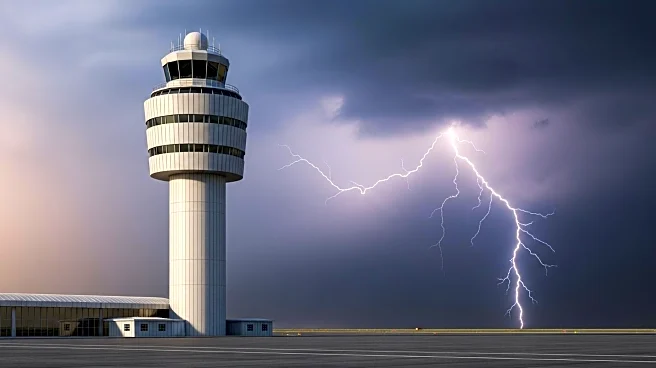What is the story about?
What's Happening?
A ransomware attack on Collins Aerospace, a major supplier of aerospace and defense solutions, has led to significant disruptions at several major airports across Europe. The attack affected check-in and boarding systems, forcing airports to resort to manual processes, resulting in delays and flight cancellations. The incident impacted airports in the UK, Germany, Belgium, and Ireland, including London’s Heathrow, Brussels Airport, and Berlin Brandenburg. While Heathrow reported minimal delays, Brussels Airport experienced substantial disruptions, canceling nearly 140 flights. The UK’s National Cyber Security Centre is investigating the incident alongside the Department of Transport. An internal memo from Heathrow revealed extensive system corruption, with over a thousand computers affected and remote restoration deemed impossible.
Why It's Important?
The ransomware attack on Collins Aerospace highlights vulnerabilities in critical infrastructure, particularly in the aviation sector. The disruption of airport operations underscores the potential for cyberattacks to cause significant economic and logistical challenges. Airlines and passengers face immediate impacts, including delays and cancellations, which can lead to financial losses and reputational damage. The incident also raises concerns about the security of systems used in essential services, prompting a reevaluation of cybersecurity measures in the industry. As cyber threats continue to evolve, the need for robust security protocols becomes increasingly urgent to protect against future attacks.
What's Next?
Collins Aerospace is in the process of completing software updates to restore systems, although the timeline for full recovery remains uncertain. The investigation by the UK’s National Cyber Security Centre and the Department of Transport may lead to enhanced cybersecurity measures and protocols to prevent similar incidents. Airports affected by the attack will likely review their security infrastructure and consider additional safeguards. The aviation industry may face increased scrutiny and pressure to improve cybersecurity resilience, potentially leading to new regulations or standards. Stakeholders, including airlines and airport operators, will need to collaborate on strategies to mitigate risks and ensure operational continuity.
Beyond the Headlines
The attack on Collins Aerospace may have broader implications for the cybersecurity landscape, particularly concerning the aviation industry. The involvement of cybercrime groups like ShinyHunters and Scattered Spider suggests a persistent threat from organized cybercriminals targeting critical infrastructure. The incident could prompt discussions on international cooperation and information sharing to combat cyber threats. Additionally, the attack may influence public perception of cybersecurity in the aviation sector, leading to increased demand for transparency and accountability from service providers.















